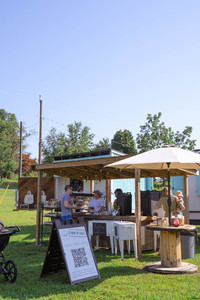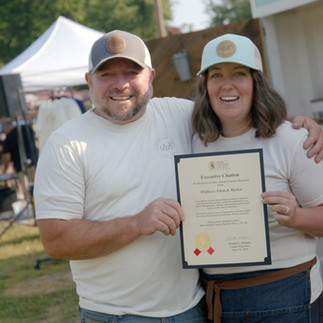Behind the Barn Doors: The Cost of Being Marketable, But Not Fundable
- Bridget Jones

- Aug 17
- 6 min read
There’s a strange kind of heartbreak that happens when you realize the story everyone loves doesn’t actually sustain you.
Wildberry is well-known. We’ve become a name (and a face) that people recognize at random places like the dump, the post office, at local events. But recognition doesn’t pay the bills. And while we’re deeply grateful for every kind word, every photo taken, every moment shared here… we’re also reckoning with the truth:
We’ve created a beloved public space without public funding. A community resource without community resourcing. A third space without third-party support.
And we’re tired.
This isn’t a complaint, and it's not about one person, business, or vendor. It’s a reckoning about the bigger reality of running a privately-owned, public-facing space in an overall system that doesn't support it. A peeling back of the curtain for anyone who’s ever wondered how something so beautiful and full of heart can still feel unsustainable behind the scenes.
We’ve poured everything we have into Wildberry... emotionally, physically, financially, spiritually. But being marketable isn’t the same as being fundable. And we’re learning that the hard way.
This is the story of what happens when the applause is loud but the support is quiet. When a dreamer builds something for everyone, but the weight of it is carried by just a few.
We Thought We Were Building Something Together
For years, we showed up every week with the belief that we were building something together.
Together with the people and partners we welcomed into this space, the community we opened our doors to, the organizations we supported and uplifted.
We weren’t just hosting a farmers market, or farm events, we were trying to create a third space. The kind of space that offers more than a transaction. A place to gather, wander, taste, talk. A soft landing. A place to be.
We believed that if we could offer something beautiful, consistent, community-centered, and values-aligned, the support would follow.
And for a while, it did.
But what we didn’t realize was that while we were pouring every ounce of effort into keeping the lights on, both emotionally and literally, the scale of the work required to hold that container grew heavier, even as the outside support grew lighter.
We started 2025 with full confidence that the Field Market would be a core piece of our family income. That it would grow into, and continue to be, a shopping destination that would eventually evolve into an on-farm store and community gathering space.
We were wrong. And that realization broke our hearts.
Not because it wasn’t successful on paper, according to the numbers from previous years we were on the fast track to that very goal, but because the emotional and logistical cost of keeping it going became something we could no longer carry.
And so, when signups dried up this year, we pulled every funding lever we could find from loans and grants, to county programs... but the message was always the same: we aren’t scalable, we aren’t fundable, we aren’t what they're looking for. We are inspiring, but not investable. Marketable, but not fundable.
Even now, as we shift our focus, we still get messages surprised we're not doing things the way we used to. It feels like we’re screaming into the void. And maybe that’s why we’re writing this. Not to beg. Not to blame. But to say it clearly:
We are not a publicly funded park.
We are not a government-run community center.
We are not a grant-backed nonprofit.
We are two people, just a husband and wife, trying to hold up a whole ecosystem that shouldn’t depend on just two hands.
The Very Organizations Meant to Help, Haven’t
This might be the part that hurts the most.
We’ve been used for visibility. Held up as a local success story by the very organizations who ghost us when we ask for help. Our story is good for marketing, but not for money. Our photos are good for newsletters, but not for loans. Our land is good for talking points, but not spreadsheets.
We have sat in too many rooms where the questions asked of us revealed how little anyone understood what Wildberry is. We’ve been told our financials are deal-breakers, our growth is too niche, our model too heart-centered. We’ve been given suggestions when we asked for support, and silence when we asked for funding.
Let’s be clear: we aren’t entitled to help. But when you’re one of the only community gathering spaces in the Crownsville/Millersville area that’s not a paid-membership or neighborhood park, you’d think someone would notice the gap we’re filling.
There are no community centers here.
There are no town squares.
There’s a trail with unopened bathrooms.
Two elementary schools.
And there’s Wildberry.
That’s it.
Our Prophetic Winter
This past winter, I saw it coming. I felt it in my bones.
There was a thread circulating online, one where vendors were venting about how much booth fees had increased, how hard it was to make money at markets, how saturated everything had become. And I understood every word, it was a reminder that both sides, market hosts and vendors alike, are feeling the pinch right now. But I also offered a gentle warning:
“Just be aware. Your favorite markets need you, too. If people don’t show up or sign up, these spaces will disappear.”
And they are.
The very thing I feared is what happened.
And I’ll be honest, it made me question everything. I lost sleep. I walked through the days in a fog. I knew in my gut we had made the wrong call by prioritizing the market when we should have leaned into events, storytelling and hospitality. But the decision had been made. Vendors had paid. And we are not the kind of people who go back on our word. So we kept showing up. Even when it was hard. Even when it cost us.
And we hoped. We hoped if we kept going, it would balance out.
But it didn’t.
Marketable, But Not Fundable
Being visible isn’t the same as being valued. Being loved isn’t the same as being sustained.
We’re marketable, but not fundable.
Valued, but not resourced.
Appreciated, but often undercut.
And it’s left us with a hard truth:
Right now, we’re sitting on almost a million dollars of farmland in one of the most desired places in Maryland… and struggling to pay our bills.
If nothing changes, we have three options:
We shut Wildberry down and lease the land to another farmer who will likely spray herbicides, pesticides, and synthetic fertilizer on the fields we’ve spent five years healing.
We access real, meaningful support from local agencies, nonprofits, funders, or aligned collaborators who understand the deeper value of what we’re doing.
We sell to a developer and let this become a neighborhood. We’d make more than enough to retire. But the heart of this place would be gone.
The truth? We’re not going to sell. Not really. Not deep down. The land means too much.
But the fact that it’s even tempting says a lot about how hard it’s been to hold this vision alone.
What’s Next
We’ve always said Wildberry would grow with us. And right now, that growth looks like change.
In 2026, we’re shifting to a model that protects our energy, our mission, and our future. That means fewer events, more intentional offerings, and a clear focus on the branches of Wildberry that are actually sustainable.
But we can’t build the next chapter without support.
(And we’re not talking about more “likes” or “great job” DMs.)
We’re talking about tangible support:
Buying the things we make.
Coming to the events we host.
Telling your friends about us.
Reaching out to your representatives.
Intentionally using your dollars for change.
Because here’s the thing: if Wildberry disappears, it won’t be because Matt and I didn’t love it enough.
It’ll be because love alone wasn’t enough to keep it going.
How You Can Help
If this moved you, here are a few ways you can help:
Share this blog post with a friend or local leader who cares about small farms and community spaces.
Support the farm directly by shopping our online store, buying tickets to an event, or telling someone in your life about Wildberry.
Reach out to your county rep and tell them what Wildberry means to you. (We’ll be sharing a copy-and-paste email template soon.)
Help us keep telling the truth. Forward this to someone who has ears to hear.
We’re not asking for handouts. We’re asking for a community. One that gives back. One that hears us. One that helps us build something lasting.
Because spaces like Wildberry don’t just happen.
They’re made.
And they’re kept alive... together. And to those who have continued to support us, check-in on us, and hold space for us:
Thank you doesn't begin to cover it. Thank you for seeing us, holding us, and seeing the future we also dream for Wildberry and our community.




























Comments